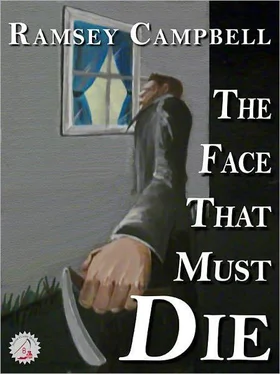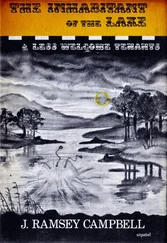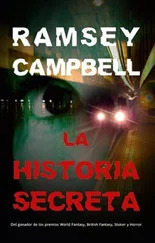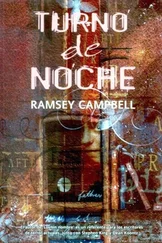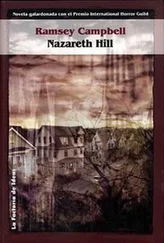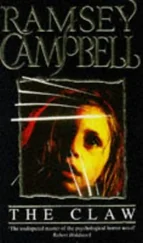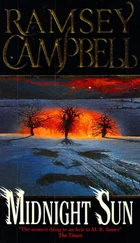Ramsey Campbell - The Face That Must Die
Здесь есть возможность читать онлайн «Ramsey Campbell - The Face That Must Die» весь текст электронной книги совершенно бесплатно (целиком полную версию без сокращений). В некоторых случаях можно слушать аудио, скачать через торрент в формате fb2 и присутствует краткое содержание. Жанр: Триллер, на английском языке. Описание произведения, (предисловие) а так же отзывы посетителей доступны на портале библиотеки ЛибКат.
- Название:The Face That Must Die
- Автор:
- Жанр:
- Год:неизвестен
- ISBN:нет данных
- Рейтинг книги:4 / 5. Голосов: 1
-
Избранное:Добавить в избранное
- Отзывы:
-
Ваша оценка:
- 80
- 1
- 2
- 3
- 4
- 5
The Face That Must Die: краткое содержание, описание и аннотация
Предлагаем к чтению аннотацию, описание, краткое содержание или предисловие (зависит от того, что написал сам автор книги «The Face That Must Die»). Если вы не нашли необходимую информацию о книге — напишите в комментариях, мы постараемся отыскать её.
The Face That Must Die — читать онлайн бесплатно полную книгу (весь текст) целиком
Ниже представлен текст книги, разбитый по страницам. Система сохранения места последней прочитанной страницы, позволяет с удобством читать онлайн бесплатно книгу «The Face That Must Die», без необходимости каждый раз заново искать на чём Вы остановились. Поставьте закладку, и сможете в любой момент перейти на страницу, на которой закончили чтение.
Интервал:
Закладка:
“ Sometime. No point until I’ve finished University. Listen,” he said, taking her hands, “don’t get paranoid. We’ll be all right here for another year or so. Nothing else is going to happen. It’s a good house.”
So he did know how she felt, and was actually responding. He stroked her hair as she rested her cheek on his chest. She didn’t want to move, for their shared moments were becoming rarer – she wasn’t sure why. Did that happen in all marriages? She’d have to move soon, to tend the moussaka.
“ Hey, listen.” He patted her cheek. “Christ, I’ve just had an idea.”
She sat up eagerly. “You say old Harty’s leaving,” he said. “I’ll bet he was the guy who set the fuzz on Craig.”
She sagged a little; she’d hoped he meant to talk about moving. “Just think about it,” he urged her. “He didn’t seem too upset on Friday night, when you think what he must have seen. I’ll bet he was glad someone got Craig.”
Perhaps he was right, or perhaps the caller had been the other man on the ground floor: he was anonymous enough. Both ideas depressed her. “I’ve got to look after the dinner,” she said, standing up.
“ Smells good.” Had that cost him an effort? He seemed disappointed that his theory hadn’t cheered her up. “Things are going to be all right,” he insisted. “Let’s just stay away from the law, okay? We won’t need them.”
Chapter XIV
Today the sun was bright between the tower blocks. Even the blocks looked clean as bone. Glass gleamed like jagged dew among the grass blades. Passing cars exploded silently with light, and touched off explosions in the windows of flats. It was warm enough for Horridge to go out without his coat and buy a new one.
On Saturday morning, when he’d risen from his soundest sleep for years, he’d thought of continuing to wear the reversible, tartan outwards. Craig’s blood would be a secret badge of his achievement. But when he’d slipped his arms into the sleeves, the coat had felt clammy. He’d struggled out of it and had hung it in the wardrobe. To throw it away might have attracted attention.
He went downtown to the Army and Navy Stores, which seemed least expensive. Government surplus raincoats – pale, almost white – were selling cheap. He tried one on, and found that it made him look like a detective in an old film. That amused him: now that he didn’t need to play detective, it was a good disguise.
He bought the coat, then limped in search of newspapers, taking care not to buy more than one at any stall. He wandered amid the crowds for a while, enjoying his disguise, until a twinge of nervousness urged him home. Suppose someone broke into his flat while his documents were in the wardrobe? Besides, he had to find out what lies the newspapers were telling about him today.
He spread the new ones on the table, together with the earlier reports. Today the lies, where there were any reports at all, were lurking inside the papers. On Saturday there had been headlines so large and black they might have been shouting at illiterates, which no doubt they were. NEW RAZOR HORROR. ANOTHER HOMOSEXUAL SLASHING. NEW LIVERPOOL SLASHING HORROR. They sounded like slogans for trashy films.
His anger was mounting. He’d paid good money to read this rubbish about himself – to see his exploit served up as entertainment to the mob. But the reports were worse. Today’s said only that enquiries were proceeding, but the earlier ones had had far too much to say. He scrabbled papers aside, and found the worst:
Police today issued a statement about the murder of Roy Craig, of Aigburth Drive, Liverpool.
It was revealed that Mr Craig was well known in Liverpool’s homosexual community. For this reason
What community? Where was it supposed to be? Lurking in some dark place, afraid to venture out into the light – its members knew that if decent people knew about it, they wouldn’t let it exist for long. Community, indeed! Animals couldn’t form communities!
For this reason, police are considering the theory that his death was a “carbon copy” murder, inspired by the murders of two homosexuals in Liverpool last year.
What were they trying to insinuate? That Horridge couldn’t think for himself? That he was a homosexual? They’d better be careful what they were saying! He hurled the newspaper to the floor, but it floated down lazily, mocking him. He grabbed the day’s Liverpool Daily Post. What had they to say for themselves? Before he could find a report, the editorial caught his eye:
Often, in its demands that crimes should be solved instantly or always prevented, the public seems to forget the difficulties under which our police labour. Undermanned, with a multitude of taxing and often thankless tasks
He restrained his fist before it had crumpled more than a corner of the page. How much had the paper been paid to say that? They were all in it together, insinuating filth about him. He knew what the so-called difficulties of the police were: that they were incompetent, or worse. He’d read enough lying for today. He swept the papers together in a heap. Had some pages sneaked into the wrong papers? It didn’t matter; they were all the same. He was snatching up pages that had escaped the heap, and piling them indiscriminately on top, when he saw the report that he had missed in the latest batch:
Police are still investigating the murder of a Liverpool homosexual on Friday night. Later that night, on Princes Avenue in Liverpool, an unprovoked attack was made on a coloured man by three youths. He was cut about the face with a razor, and later had to receive seven stitches. This incident occurred about a mile from the scene of the murder.
Horridge stared at the cramped box of print. He felt as though its frame had closed about him. What were they trying to do? “Unprovoked attack” indeed – what had a foreigner been doing out so late, unless he was up to no good? Yet that thought didn’t prevent the report from distressing him. They’d made him sound like a young thug, terrorising people. Was that how his achievement sounded?
His fist thumped the table; the newspapers trembled. No, by God. He was no thug. He was one of the few who still stood up for what was right – and he’d write to them to tell them so. No; letters could be traced. He’d phone them.
Then he grinned. His closed lips tightened over his teeth; his eyes stretched wide. He sat forward, trapping his legs beneath the table. No, he’d do no phoning. That was precisely what they wanted. All their lies and insinuations were meant to make him betray himself. Let them try. He wasn’t Craig, to be distressed so easily.
He dumped the newspapers in the drawer. He didn’t know why he bothered keeping them, except to remind him how sly people were. Well, they could stay shut up in there. They had nothing to tell him. He was turning away when he remembered the editorial.
Gradually his mouth widened into a smile. Of course, he hadn’t been thinking straight. Their confusion had almost infected him. His mounting glee couldn’t be contained by the small room. He must walk, it didn’t matter where.
Mightn’t people notice his new coat and wonder why he had bought it? It didn’t matter. People bought new coats sometimes, even people as badly off as he. Nobody could suspect anything – not when even the police were so mistaken.
He walked, alert with gladness. His relief possessed him; everything looked interesting. His first idea had been right after all: the police were simply incompetent. Each of their theories led them further from him. They would never think to search for someone like him. He was safe.
He enjoyed all he saw. He grinned to himself at the sight of a minute general store housed in a shabby caravan in a parking space. Even the scenic area, which had used to infuriate him, only amused him now: the benches that commanded a view of caged saplings, children’s deserted swings, a few low humps of grassy earth, all walled around by Cantril Farm barracks. There must be somewhere he could enjoy himself more fully. Where could he go?
Читать дальшеИнтервал:
Закладка:
Похожие книги на «The Face That Must Die»
Представляем Вашему вниманию похожие книги на «The Face That Must Die» списком для выбора. Мы отобрали схожую по названию и смыслу литературу в надежде предоставить читателям больше вариантов отыскать новые, интересные, ещё непрочитанные произведения.
Обсуждение, отзывы о книге «The Face That Must Die» и просто собственные мнения читателей. Оставьте ваши комментарии, напишите, что Вы думаете о произведении, его смысле или главных героях. Укажите что конкретно понравилось, а что нет, и почему Вы так считаете.
